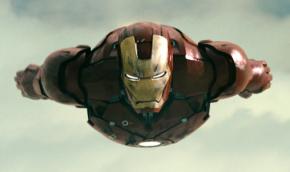Iron Man seeks redemption
looks at the movie Iron Man's take on the corrupt weapons industry.
IF YOU haven't given in to the peer pressure from coworkers and friends to see this film, do so now. Directed by acclaimed Swingers creator Jon Favreau, Iron Man premiered this past weekend to sold-out theaters across the country, far surpassing expectations, even for the most skeptical critics.
The film begins in a patriotic fervor when Tony Stark (Robert Downey Jr.), the womanizer, drunk and CEO of weapons manufacturing company Stark Industries, is captured by Afghan terrorists while trying to sell his new "freedom line" of high-tech weapons of mass destruction.
Spending three months in captivity, Tony Stark has a change of heart. Literally. Complete with a newly implanted electromagnetic heart, Tony Stark realizes in captivity that his company has been profiting from and thereby supporting terrorism in Afghanistan (Taliban, anyone?).
He escapes by building an iron suit made from weapons his company sold to his captors. Stark Industries organizes a press conference upon his return, where against the board of director's wishes, he announces a new mission: to destroy all the weapons Stark Industries has created.
From here, stock markets plunge, corporate villains are created, and Tony Stark gets to work on the new and improved body armor (with some trial and error). The technophiles will salivate with every step in the production process, and there is something ultimately rewarding about going through the process with Tony Stark of making oneself into a superhero.
This is one of strengths of the character development throughout the movie, and what sets it apart from many other superhero films. One is always reminded that--despite the ability to take flight over the Pacific, dodge U.S. aircraft, and produce firepower capable of destroying an entire city from his elbow--Iron Man is, well, just a man.
The same is true for the principal villain of the film, Obadiah Stane (played brilliantly by Jeff Bridges), the corrupt and greedy "man behind the scenes" at Stark Industries. The turn from Afghan terrorists to the weapons manufacturing industry as the main adversary is significant.
It would have been easy for the directors to maintain the Afghan insurgency as the main target of Iron Man at a time when the U.S. government is desperate for credibility in its imperial adventures throughout the Middle East. Instead, he holds his own company accountable for war, death and destruction.
In an age of neocon madness gone terribly wrong, this is certainly a welcome story arc, especially considering the history of the Iron Man comic. Stan Lee and Marvel Comics introduced Iron Man in Tales of Suspense #39 in 1963, based partly on Howard Hughes, an aviator, industrialist and millionaire.

Employed by various national defense industries, Iron Man's chief objective was to carry out U.S. imperial aims. More than anything else, the character of Iron Man represented the invincible might of U.S. imperialism and the military industrial complex.
In his early years, the character's principal foes were Russian-backed armored villains, and the Fu Manchu-esque "Mandarin," a Chinese crime lord. The latter character would make even today's most rampant Orientalist blush, and the film foreshadows his principal role in the sequel. When he appears, it will be part of a campaign of China-bashing every bit as unsubtly racist as the depiction of the Persians/Iranians in 300.
Today's comic version of Iron Man is the principal organizer of a Patriot Act-style program forcing all super-powered beings to register with the U.S. government. The 21st century (film version of) Iron Man is seeking redemption.
To be clear, this is not an anti-imperialist film. I am not sure it even can claim to be an antiwar film. It's no coincidence that parts of the film are staged in Afghanistan, where the "good war" is currently underway--as opposed to Iraq, where the wildly unpopular occupation is failing miserably. And the violence taking place there is presented as solely the result of Afghan insurgents (represented in crude stereotypes), not the benign U.S. military whose desire to fight terrorism is undermined by a corrupt weapons manufacturer.
In fact, Stark's redemption never questions the U.S. military's role in the world: his horror is solely directed toward the use of Stark Industries' weapons being used to kill American soldiers. Granted, that might be asking a bit too much from Hollywood. And, not surprisingly, the film is filled with the "womanizing is chic" schtick that is far too commonplace in film today. Fortunately, Gwyneth Paltrow provides some depth to the stock, one-dimensional Pepper Potts.
But the film is flawless in so many other ways: tightly acted, action packed and wonderfully shot, to name a few. And for those fed up with corporate profiteering and pillaging, there is serious satisfaction watching the final battle scene, where a corrupt and evil weapons contractor who has made millions off killing innocent people, is forced to face Iron Man, equipped with a new heart.


